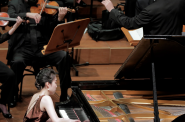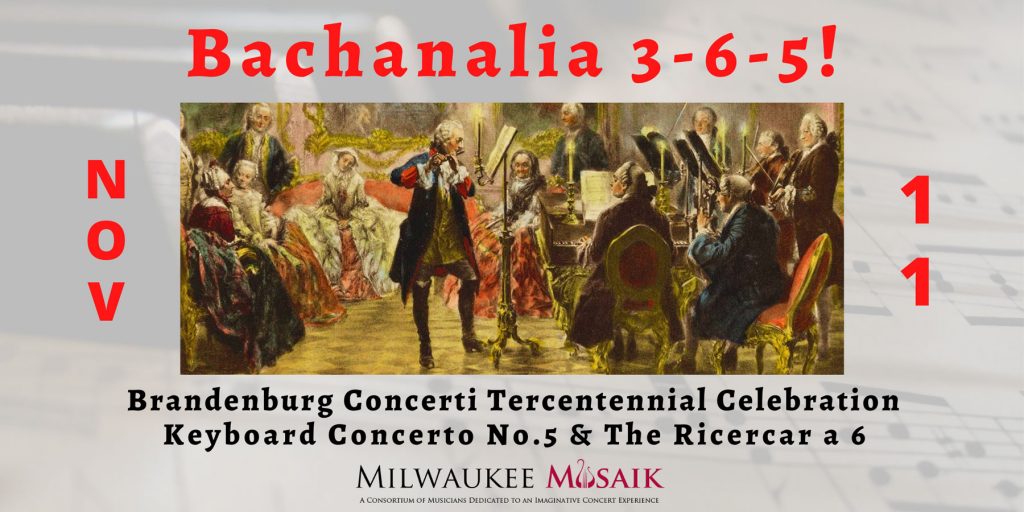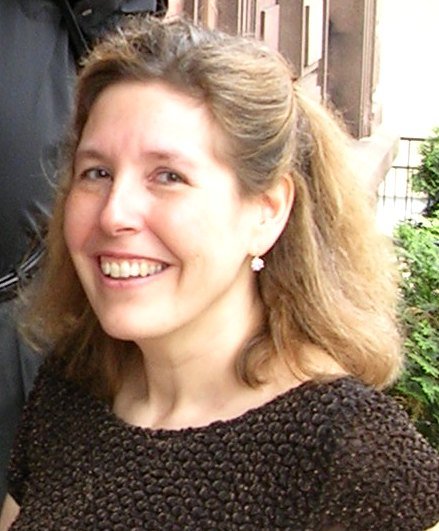Milwaukee Musaik Opens Eighth Season
An all-Bach program including three of his Brandenburg concertos.
Milwaukee Musaik returns for its 8th season with a celebration of the J.S. Bach Brandenburg Concertos this Thursday evening at the Women’s Club of Wisconsin. The musicians, primarily Milwaukee Symphony Orchestra members, come together in this more intimate setting for chamber music.
Concertos have long been a key element in most symphony concerts. The form features a soloist with dramatic virtuoso music backed by the orchestra in a secondary role. The Baroque era concerto grosso often engaged several soloists (the concertino) working to together in dialogue with the entire ensemble (the ripieno) for a more unified effect. Bach’s Brandenburg Concertos, a collection of six works meant to demonstrate the breadth of this format, are particularly popular with players as their contributions are more transparent and solo turns shared among several instruments.
Stefanie Jacob, well known as the pianist for the Prometheus Trio, will play the harpsichord in most of the works in this concert.
The concert will open with a more traditional concerto, Keyboard Concerto No. 5 in F minor, BWV 105. Often performed as a piano concerto, the original harpsichord work offers a very different experience. The crystalline short tones, created originally by plucking the strings with the quills of raven feathers, contrast with the heavy overtones and sustained sounds of a piano’s hammered strings.
Jacob will be playing an electronic harpsichord. By reproducing samples of genuine harpsichord sounds rather than offering a synthetic experience. As an additional benefit, there will be no delays to re-tune the instrument between works.
Three of the Brandenburg Concertos have been selected.
The Brandenburg Concerto No. 3 in G major, BWV 1048 engages the entire ensemble by shifting the lead roles in turn to three violins, three violas, and three cellos. The three-way conversation is grounded by a harpsichord accompaniment.
The Brandenburg Concerto No. 5 in D major, BWV 1050 features a violin, flute, and harpsichord trio (Jeanyi Kim, Heather Zinninger Yarmel, and Jacob). The harpsichord, often relegated to basic background roles, enjoys a standout role with a dramatic, tour de force — a lengthy cadenza in the first movement.
Jacob has been impressed by the electronic harpsichord used for this concert. “This particular instrument feels much better under my fingers than a conventional harpsichord,” she says. “The action is very light, and the many 32nd notes in Brandenburg 5 really sparkle!”
The Brandenburg Concerto No. 6 in B-flat major, BWV 1051 features two violas as soloists (Nathan Hackett and Alejandro Duque) with a brief solo turn for a cello (Scott Tisdel). Two additional cellos, bass and harpsichord complete the ensemble. The deeper tone of the work is made possible by eliminating violins altogether!
Six players will highlight another Bach specialty. Ricercare a 6, from The Musical Offering, BWV 1079 features five strings and flutist Heather Zinninger Yarmel in a breathtaking six-part fugue. Demonstrating his prowess with variations, Bach wrote a collection of works based upon a single theme. This ricercare variation took the exercise to another level through the extraordinary counterpoint composition required to juxtapose six players.
Are twelve players too small an ensemble for orchestral works? Mandl points out that Bach often had fewer players available to him at the time. The ever-changing roles for players allow the audience a unique opportunity to focus on the contributions of individual players, lost in the unified orchestra sound on the Allen Bradley Concert Hall stage. One can be certain that the performers enjoy that opportunity too!
The concert begins at 7:00 p.m., Thursday, November 11 at the Women’s Club of Wisconsin at 813 E. Kilbourn Ave. in downtown Milwaukee. The Women’s Club ballroom may be less frequently used today, but the warm acoustic in the room offers an ideal setting for a small ensemble. Tickets can be purchased online or at the door. The bargain $25 price is reduced to $10 for students.
A pre-concert “Happy Hour” experience is available for purchase at the Woman’s Club of Wisconsin prior to the performance. For reservations email leah@wc-wi.org or call 414-276-5170.
The Milwaukee Musaik season returns to the Women’s Club on January 14 with Folk Tones.
Preview
-
PianoArts Festival Features Rising Stars
 May 28th, 2024 by Michael Barndt
May 28th, 2024 by Michael Barndt
-
Four Nations Ensemble Goes For Baroque
 May 13th, 2024 by Michael Barndt
May 13th, 2024 by Michael Barndt
-
Mozart on Prospect Avenue
 May 9th, 2024 by Martha Brown
May 9th, 2024 by Martha Brown






















